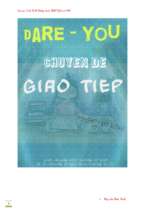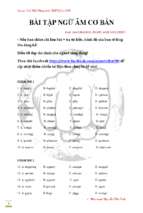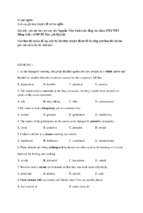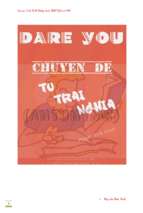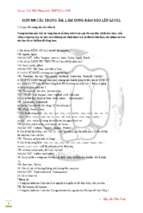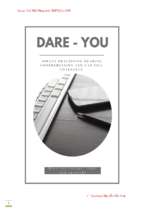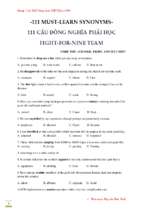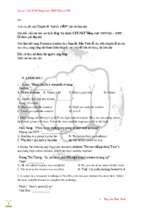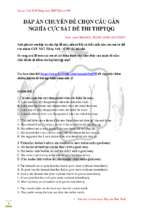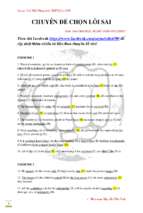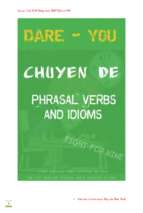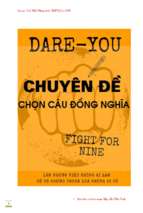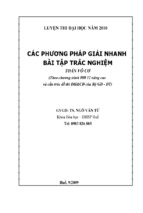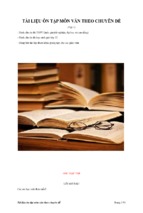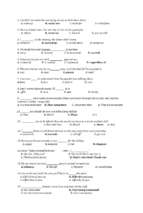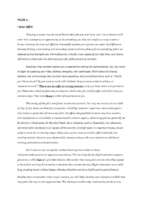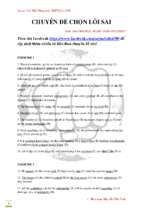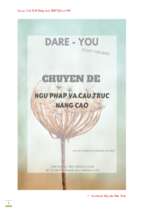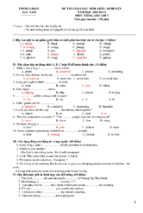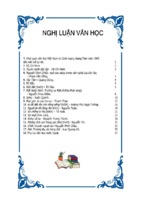Group: CµY N¸T TiÕng Anh THPTQG – 6789!
Facebook: Nguyễn Tiến Vinh
1
Group: CµY N¸T TiÕng Anh THPTQG – 6789!
Hi các bạn!
Rất vui khi cùng mọi người tiếp tục với thử thách số 2, thử thách này liên quan tới đọc hiểu cũng như
đục lỗ “30 days practising reading comprehension and gap-fill challenge”.
Các em nghĩ như thế nào nếu chúng ta làm liên tiếp các bài đọc hiểu trong vòng 30 ngày không nghỉ?
Nếu em chưa có cơ hội tham gia thử thách nào, thì anh khuyên hãy tham gia thử thách này đi, mỗi
ngày 1 bài đọc hiểu, 1 bài đục lỗ, sau 30 ngày các em sẽ thấy con người mình khác trông thấy!
Để chinh phục được thử thách này, hãy tạo cho mình một thói quen làm bài nghiêm túc, dù có khó
cũng phải làm, sau đó phải xem xét thật kĩ những lỗi sai mình gặp phải để lần sau không gặp nữa!
Làm đọc hiểu là cuộc đua của từ vựng, các em phải trau dồi theo tháng mới lên được trình độ!
Để tham khảo cũng như theo dõi nhiều tài liệu khác, các bạn nhớ theo dõi nick Facebook: Nguyễn
Tiến Vinh nhé!
Dare to change, fight and succeed!
You can do it!
NGÀY 1.
* ĐỌC HIỂU
Choosing a career may be one of the hardest jobs you ever have, and it must be done with
care. View a career as an opportunity to do something you love, not simply as a way to earn a living.
Investing the time and effort to thoroughly explore your options can mean the difference between
finding a stimulating and rewarding career and move from job to unsatisfying job in an attempt to find
the right one. Work influences virtually every aspect of your life, from your choice of friends to where
you live. Here are just a few of the factors to consider.
Deciding what matters most to you is essential to making the right decision. You may want to
begin by assessing your likes, dislikes, strengths, and weaknesses. Think about the classes, hobbies,
and surroundings that you find most appealing. Ask yourself questions, such as “Would you like to
travel? Do you want to work with children? Are you more suited to solitary or cooperative work?”
There are no right or wrong answers; only you know what is important to you. Determine which
job features you require, which ones you would prefer, and which ones you cannot accept. Then
rank them in order of importance to you.
Facebook: Nguyễn Tiến Vinh
2
Group: CµY N¸T TiÕng Anh THPTQG – 6789!
The setting of the job is one factor to take into account. You may not want to sit at a desk all
day. If not, there are diversity occupation – building inspector, supervisor, real estate agent – that
involve a great deal of time away from the office. Geographical location may be a concern, and
employment in some fields in concentrated in certain regions. Advertising job can generally be found
only in large cities. On the other hand, many industries such as hospitality, law education, and retail
sales are found in all regions of the country. If a high salary is important to you, do not judge a career
by its starting wages. Many jobs, such as insurance sales, offers relatively low starting salaries;
however, pay substantially increases along with your experience, additional training, promotions and
commission.
Don’t rule out any occupation without learning more about it. Some industries evoke positive
or negative associations. The traveling life of a flight attendant appears glamorous, while that of a
plumber does not. Remember that many jobs are not what they appear to be at first, and may have
merits or demerits that are less obvious. Flight attendants must work long, grueling hours without
sleeps, whereas plumbers can be as highly paid as some doctors.
Another point to consider is that as you mature, you will likely develop new interests and skills that
may point the way to new opportunities. The choice you make today need not be your final one.
Question 1: The author states that “There are no right or wrong answers” in order to______.
A. emphasize that each person’s answers will be different.
B. show that answering the questions is a long and difficult process.
C. indicate that the answers are not really important.
D. indicate that each person’s answers may change over time.
Question 2: The word “them” in paragraph 2 refers to________.
A. questions
B. answers
C. features
D. jobs
Question 3: According to paragraph 3, which of the following fields is NOT suitable for a person
who does not want to live in a big city?
A. plumbing
B. law
C. retail sales
D. advertising
Question 4: The word “that” in paragraph 4 refers to_________.
A. occupation
B. the traveling life C. a flight attendant
D. commission
Question 5: It can be inferred from the paragraph 3 that______.
A. jobs in insurance sales are generally not well-paid.
B. insurance sales people can earn high salary later in their career.
C. people should constantly work toward the next promotion.
D. a starting salary should be an important consideration in choosing a career.
Question 6: In paragraph 5, the author suggests that_____.
A. you may want to change careers at some time in the future.
Facebook: Nguyễn Tiến Vinh
3
Group: CµY N¸T TiÕng Anh THPTQG – 6789!
B. as you get older, your career will probably less fulfilling.
C. you will be at your job for a lifetime, so choose carefully.
D. you will probably jobless at some time in the future.
Question 7: According to the passage, which of the following is TRUE?
A. To make a lot of money, you should not take a job with a low starting salary.
B. To make lots of money, you should rule out all factory jobs.
C. If you want an easy and glamorous lifestyle, you should consider becoming a flight attendant.
D. Your initial view of certain careers may not be accurate.
* ĐỤC LỖ
Why is that many teenagers have the energy to play computer games until late at night but
cant find the energy to get out of bed (1)____for school? According to a new report, today’s
generation of children are in danger of getting so (2)____sleep that they are putting their mental and
physical health at(3)____. Adults can easily survive on seven to eight hours’ sleep a night,
(4)_____teenagers requirenine or ten hours. According to medical experts, one in five youngsters
(5)____anything between two and five hours’ sleep a night less than their parents did at their age.
Question 1. A. behind time
B. about time
C. in time
D. at time
Question 2. A. few
B. less
C. much
D. little
Question 3. A. jeopardy
B. threat
C. risk
D. danger
Question 4. A. or
B. because
C. whereas
D. so
Question 5. A. put
B. gets
C. brings
D. makes
Facebook: Nguyễn Tiến Vinh
4
Group: CµY N¸T TiÕng Anh THPTQG – 6789!
NGÀY 2
* ĐỌC HIỂU
Franklin D. Roosevelt, the 32nd president of the United States, was from a wealthy, wellknown family. As a child, he attended private school, had private tutors, and traveled with his parents
to Europe. He attended Harvard University, and afterward studied law. At the age of 39, Roosevelt
suddenly developed polio, a disease that left him without the full use of his legs for the rest of his life.
Even though the worst of his illness, he continued his life in politics. In 1924, he appeared at the
Democratic National Convention to nominate Al Smith for president, and eight years after that he was
nominated for the same office. Roosevelt was elected to the presidency during the Great Depression
of the 1930s, at a time when more than 5,000 banks had failed and thousands of people were out of
work. Roosevelt took action. First he declared a bank holiday that closed all the banks so that no
more could fail; then he reopened the banks little by little with government support. Roosevelt
believed in using the full power of government to help what he called the "forgotten people." And it
was these workers, the wage earners, who felt the strongest affection toward Roosevelt. There were
others, however, who felt that Roosevelt's policies were destroying the American system of
government, and they opposed him in the same intense way that others admired him.
In 1940 the Democrats nominated Roosevelt for an unprecedented third term. No president
in American history had ever served three terms, but Roosevelt felt an obligation not to quit while the
United States' entry into World War II was looming in the future. He accepted the nomination and
went on to an easy victory.
Question 1. What does the passage mainly discuss?
A. Political aspects of Roosevelt's life.
B. Problems during the Great Depression.
C. Roosevelt's upbringing.
D. Criticisms of Roosevelt's actions.
Question 2. Which one of the following statements is NOT mentioned in the passage?
A. Roosevelt was elected during the Great Depression.
B. Roosevelt voted for Al Smith.
C. Roosevelt had difficulty walking during his presidency.
D. Roosevelt supported strong government powers.
Question 3. The phrase "took action" in lines 13 is used to illustrate the idea that Roosevelt
A. performed admirably
B. exerted himself physically
C. responded immediately
Facebook: Nguyễn Tiến Vinh
5
Group: CµY N¸T TiÕng Anh THPTQG – 6789!
D. got assistance
Question 4. Which of the following is NOT TRUE?
A. Roosevelt served three terms of presidency
B. Roosevelt couldn’t walk easily
C. All American citizens supported Roosevelt’s policies
D. Roosevelt studied law before he worked as a president
Question 5. The word “affection” as used in the first paragraph could best be replaced by which of
the following?
A. fascination
B. fondness
C. lure
D. appeal
Question 6. The word “unprecedented” in the second paragraph could best be replaced by _____.
A. unimportant
B. unheard of
C. unjustified
D. unhampered
Question 7. It can be inferred from the passage that the people who liked Roosevelt best were
_______.
A. poor people
B. bankers
C. rich people D. average workers
Question 8. In the second paragraph, the author uses the word “looming” to indicate a feeling of ___.
A. reservation
B. determination
C. regret
D. threat
* ĐỤC LỖ
I was raised on a farm in a remote village in the 1950s. The winter
months were endless and
everything was covered in snow. I was always (1) __________ for the warmer weather to come.
When spring arrived, everything came alive - flowers would bloom and the animals would come out
of hibernation. I would follow the bear tracks and search for them. Once, however, I (2) ___________
an angry mother bear who saw me (3) ___________ a threat. (4) __________ the sight of the bear, I
did what my father had told me. I stood still until she stopped growling and walked away. The trick
was effective, but looking back now, I realized that the situation was (5) ____________ - more
serious than I thought at the time.
Question 1. A. willing
B. keen
C. eager
D. enthusiastic
Question 2. A. found out
B. came across
C. dealt with
D. reached
Question 3. A. as
B. same as
C. such as
D. like
Question 4. A. by
B. at
C. on
D. in
Question 5. A. very
B. quite
C. far
D. so
Facebook: Nguyễn Tiến Vinh
6
Group: CµY N¸T TiÕng Anh THPTQG – 6789!
NGÀY 3
* ĐỌC HIỂU
In early civilization, citizens were educated informally, usually within the family unit.
Education meant simply learning to live. As civilization became more complex, however, education
became more formal, structured, and comprehensive. Initial efforts of the ancient Chinese and Greek
societies concentrated solely on the education of males. The post-Babylonian Jews and Plato were
exceptions to this pattern. Plato was apparently the first significant advocate of the equality of the
sexes. Women, in his ideal state, would have the same rights and duties and the same educational
opportunities as men. This aspect of Platonic philosophy, however, had little or no effect on education
for many centuries, and the concept of a liberal education for men only, which had been espoused by
Aristotle, prevailed.
In ancient Rome, the availability of an education was gradually extended to women, but they
were taught separately from men. The early Christians and medieval Europeans continued this trend,
and single-sex schools for the privileged through classes prevailed through the Reformation period.
Gradually, however, education for women, in a separate but equal basis to that provided for men, was
becoming a clear responsibility of society. Martin Luther appealed for civil support of schools for all
children. Al the Council of Trent in the 16th century, the Roman Catholic Church encouraged the
establishment of free primary schools for children of all classes. The concept of universal primary
education, regardless of sex, had been born, but it was still in the realm of the single-sex school.
In the late 19th and early 20th centuries, co-education became a more widely applied principle
of educational philosophy. In Britain, Germany, and the Soviet Union the education of boys and girls
in the same classes became an accepted practice. Since World War II, Japan and the Scandinavian
countries have also adopted relatively universal co-educational systems. The greatest negative
reaction to co-education has been felt in the teaching systems of the Latin countries, where the sexes
have usually been separated at both primary and secondary levels, according to local conditions.
A number of studies have indicated that girls seem to perform better overall and in science in
particular. In single-sex classes, during the adolescent years, pressure to conform to stereotypical
female gender roles may disadvantage girls in traditionally male subjects, making them reluctant to
volunteer for experimental work while taking part in lessons. In Britain, academic league tables point
to high standards achieved in girls’ schools. Some educationalists, therefore, suggest segregation of
the sexes as a good thing, particularly in certain areas, and a number of schools are experimenting
with the idea.
Question 1: Ancient education generally focused its efforts on __________.
A. male learners
B. Both sexes
C. female
D. Young people only
Facebook: Nguyễn Tiến Vinh
7
Group: CµY N¸T TiÕng Anh THPTQG – 6789!
Question 2: Education in early times was mostly aimed at __________.
A. teaching skills
B. learning to live
C. learning new lifestyles
D. imparting survival skills
Question 3: The first to support the equality of the sexes was __________.
A. the Chinese
B. the Greek
C. Plato
D. the Jews
Question 4: The word “informally” in this context mostly refers to an education occurring
__________.
A. in classrooms
B. outside the school
C. In a department
D. ability
Question 5: When education first reached women, they were __________.
A. locked up in a place with men
B. isolated from a normal life
C. deprived of opportunities
D. separated from men
Question 6: When the concept of universal primary education was introduced, education
__________.
A. was given free to all
B. was intended for all the sexes
C. focused on imparting skills
D. was intended to leave out female learners
Question 7: Co-education was negatively responded to in __________.
A. Japan
B. the Scandinavian countries
C. South American countries
D. conservative countries
* ĐỤC LỖ
Buckingham Palace, Windsor Castle and the Palace of Holyroodhouse are the official
(1) ____ of the Sovereign and, as such, serve as both home and office for The Queen, whose personal
standard flies (2) _____ Her Majesty is in residence.These buildings are used extensively for State
ceremonies and Official entertaining and are opened to the (3) _____ as much as these commitments
allow.All are furnished with fine pictures and (4) ____ of art from the Royal Collection, which has
been assembled over four centuries by successive sovereigns. Many of the State Apartments and
rooms at the official residences have been in continuous use since their conception and many of the
panting are (5)_____ in the rooms for which they were originally intended.
Question 1. A. venues
B. residences
C. situations
D. occupation
Question 2. A. whatever
B. however
C. whoever
D. whenever
Question 3. A. human
B. public
C. peoples
D. strangers
Question 4. A. painting
B. statues
C. works
D. jobs
Question 5. A. created
B. explored
C. produced
D. displayed
Facebook: Nguyễn Tiến Vinh
8
Group: CµY N¸T TiÕng Anh THPTQG – 6789!
NGÀY 4
* ĐỌC HIỂU
The biologist's role in society as well as his moral and ethical responsibility in the discovery
and development of new ideas has led to a reassessment of his social and scientific value systems. A
scientist can no longer ignore the consequences of his discoveries; he is as concerned with the
possible misuses of his findings as he is with the basic research in which he is involved. This
emerging social and political role of the biologist and all other scientists requires a weighing of values
that cannot be done with the accuracy or the objectivity of a laboratory balance. As a member of
society, it is necessary for a biologist now to redefine his social obligations and his functions,
particularly in the realm of making judgments about such ethical problems as man's control of his
environment or his manipulation of genes to direct further evolutionary development.
As a result of recent discoveries concerning hereditary mechanisms, genetic engineering, by
which human traits are made to order, may soon be a reality. As desirable as it may seem to be, such
an accomplishment would entail many value judgments. Who would decide, for example, which traits
should be selected for change? In cases of genetic deficiencies and disease, the desirability of the
change is obvious, but the possibilities for social misuse are so numerous that they may far outweigh
the benefits.
Probably the greatest biological problem of the future, as it is of the present, will be to find
ways to curb environmental pollution without interfering with man's constant effort to improve the
quality of his life.
Question 1: According to the passage, a modern scientist should be more concerned about ____.
A. his basic research
B. the development of new ideas
C. his manipulation of genes
D. the consequences of his discoveries
Question 2: The pronoun "it" in paragraph 2 refers to ____.
A. a reality
B. an accomplishment
C. genetic engineering
D. hereditary mechanism
Question 3: It is implied in the passage that genetic engineering ____.
A. may do us more harm than good
B. is no longer desirable
C. is the most desirable for life
D. will change all human traits
Question 4: The pronoun "they" in paragraph 2 refers to ____.
A. discoveries concerning hereditary mechanisms
B. effects of genetic engineering misuse
C. cases of genetic deficiencies
D. possibilities for genetic deficiencies
Question 5: What is probably the most important biological problem mentioned in the passage?
A. social and economic deficiencies
C. genetic engineering misuse
B. manipulation of genes
D. environmental pollution
Facebook: Nguyễn Tiến Vinh
9
Group: CµY N¸T TiÕng Anh THPTQG – 6789!
* ĐỤC LỖ
Fit Bodies are made to move! They are not (1) ____ for sitting around in front of the television
or reading magazines. Keeping fit doesn’t (2) _____ you have to be a super- athlete, and even (3)____
exercise can give you a lot of fun. When you're fit and healthy, you'll find you look better and feel
better. You'll develop more energy and self-confidence.
Every time you move you are exercising. The human body is designed to bend, stretch, run, jump and
climb. (4) ___ it does, the stronger and fitter it will become. Best of all, exercise is fun. It's what your
body likes doing most - keeping on the (5) ___.
Question 1. A. planned
B. designed
C. programmed
D. cause
Question 2. A. involve
B. required
C. reveal
D. mean
Question 3. A. a little
B. a few
C. little
D. few
Question 4. A. more and more B. the more
C. more
D. moreover
Question 5. A. increase
C. develop
D. decrease
B. move
Facebook: Nguyễn Tiến Vinh
10
Group: CµY N¸T TiÕng Anh THPTQG – 6789!
NGÀY 5
Any list of the greatest thinkers in history contains the name of the brilliant physicist Albert
Einstein. His theories of relativity led to entirely new ways of thinking about time, space, matter,
energy, and gravity. Einstein's work led to such scientific advances as the control of atomic energy,
even television as a practical application of Einstein's work. In 1902 Einstein became an examiner in
the Swiss patent office at Bern. In 1905, at age 26, he published the first of five major research papers.
The first one provided a theory explaining Brownian movement,the zig-zag motion of microscopic
particles in suspension. The second paper laid the foundation for the photon, orquantum, theory of
light. In it he proposed that light is composed of separate packets of energy, called quanta orphotons,
that have some of the properties of particles and some of the properties of waves. A third paper
contained the "special theory of relativity" which showed that time and motion are relative to the
observer, if the speed of light is constant and the natural laws are the same everywhere in the
universe. The fourth paper was amathematical addition to the special theory of relativity. Here
Einstein presented his famous formula, E = m(cc), known as the energy mass equivalence. In 1916,
Einstein published his general theory of relativity. In it he proposed that gravity is not a force, but a
curve in the space-time continuum, created by the presence of mass.Einstein spoke out frequently
against nationalism, the exalting of one nation above all others. He opposed war and violence and
supported Zionism, the movement to establish a Jewish homeland in Palestine. When the Nazis came
to power in 1933, they denounced his ideas. He then moved to the United States. In 1939 Einstein
learned that two German chemists had split the uranium atom. Einstein wrote to President Franklin D.
Roosevelt warning him that this scientific knowledge could lead to Germany developing an atomic
bomb. He suggested the UnitedStates begin its own atomic bomb research.
Question 1: Einstein's primary work was in the area of
A. chemistry
B. biology
C. physics
D. engineering
Question 2: Which of the following inventions is mentioned in the passage as a practical application
of Einstein's discoveries?
A. Radio
B. Automobiles
C. Computers D. Television
Question 3: According to the passage, Einstein supported all of the following except
A. the establishment of a Jewish homeland in Palestine B. Nationalism
C. atomic bomb research in the United States.
D. the defeat of the Nazis.
Question 4: In which country was Einstein born?
A. Switzerland B. United States
C. Germany
D. Israel
Question 5: What is "Brownian movement"?
A. The zig-zag motion of microscopic particles in suspension
B. The emission of electrons from solids when struck by light
C. The motion of photons in light
Facebook: Nguyễn Tiến Vinh
11
Group: CµY N¸T TiÕng Anh THPTQG – 6789!
D. The basis of the theory of relativity
Question 6: Einstein was a citizen of all of the following countries EXCEPT
A. Belgium
B. Germany
C. Switzerland D. United States
Question 7: It is clear from the tone of the passage that the author feels _______
A. Einstein's work in physics was somewhat tarnished by his conservative political views.
B. Albert Einstein was one of the most brilliant thinkers in history.
C. Einstein's work in physics, though theoretically impressive, led to few practical applications.
D. Einstein's theories have been consistently proven incorrect.
Question 8: According to Einstein's special theory of relativity______
A. all properties of matter and energy can be explained in a single mathematical formula.
B. light is composed of separate packets of energy.
C. time and motion are relative to the observer.
D. some solids emit electrons when struck by light.
Question 9: In line 15, the word "exalting" most nearly means ______
A. elevation
B. criticism
C. support
D. elimination
Question 10: According to Einstein, light is composed of separate packets of energy called ____
A. electrons
B. photoelectrons
C. quanta
D. gamma rays
* ĐỤC LỖ
Although (1) ______has always been a need for a lingua franca to facilitate communication
between people (2)______ different parts of the world, artificial languages have been singularly
unsuccessful at fulfilling this (3)_____. At first glance, this might seem surprising because a language
such as Esperanto, which is (4)__________ very easy to learn, would seem to have considerable
advantages over languages (5)_______ English, French or Spanish.
Question 1. A. that
B. it
C. there
D. which
Question 2. A. in
B. of
C. at
D. from
Question 3. A. work
B. service
C. role
D. tasks
Question 4. A. expectedly
B. supposedly C. considerably
D. presumably
Question 5. A. such as
B. like
D. alike
C. as
Facebook: Nguyễn Tiến Vinh
12
Group: CµY N¸T TiÕng Anh THPTQG – 6789!
NGÀY 6
* ĐỌC HIỂU
Leonardo da Vinci was born on April 15, 1452, in the small Tuscan town of Vinci, near
Florence.He was the son of a wealthy Florentine public official and a peasant woman. In the mid1460s, the family settled in Florence, where Leonardo was given the best education that Florence
could offer. He rapidly advanced socially and intellectually. He was handsome, persuasive in
conversation, and a fine musician and improviser. About in 1466 he apprenticed as a studio boy to
Andrea Del Verrocchio. InVerrocchio’s workshop, Leonardo was introduced to many activities, from
the painting of altarpieces and panel pictures to the creation of large sculptural projects. In 1472, he
was entered in the painter’s guild of Florence, and in 1476, he was still mentioned as Verrocchio’s
assistant. In Verrocchio’s Baptism of Christ, the kneeling angel at the left of the painting is by
Leonardo.
In 1478, Leonardo became an independent master. His first commission, to paint an altarpiece
for the chapel of the Palazzo Vecchino, the Florentine town hall, was never executed. His first large
painting, The Adoration of the Magi, left unfinished, was ordered in 1481 for the Monastery of
SanDonato a Scopeto, Florence. Other works ascribed to his youth are the so-called Benois Madonna,
the portrait Ginerva de’ Benci, and the unfinished Saint Jerome.
In 1482, Leonardos career moved into high gear when he entered the service of the duke
ofMilan, Ludovico Sforza, having written the duke an astonishing letter in which he stated that he
could build portable bridges; that he knew the techniques of constructing bombardments and of
makingcannons; that he could build ships as well as armored vehicles, catapults, and other war
machines;and that he could execute sculpture in marble, bronze, and clay. He served as a principal
engineer inthe duke’s numerous military enterprises and was so active also as an architect. In addition,
he assisted the Italian mathematician Luca Pacioli in the celebrated work Divina Proportione.
Question 1: What is NOT mentioned about the young Leonardo da Vinci?
A. He was physically attractive
B. He was a telented speaker
C. He was well-connected
D. He was gifted n many fields of art
Question 2: The word “apprenticed” in paragraph 1 is closest in meaning to _____.
A. cleaned
B. painted
C. studied
D. mastered
Question 3: What can be inferred about Andrea Del Verrocchio?
A. He was a writer
B. He was well-known
C. He was poor
D. He had many students
Question 4: How old was Leonardo da Vinci when he became an independent master?
A. 23
B. 25
C. 26
D. 28
Facebook: Nguyễn Tiến Vinh
13
Group: CµY N¸T TiÕng Anh THPTQG – 6789!
Question 5: The pronoun “he” in paragraph 3 refers to ________.
A. Leonardo da Vinci
B. The duke
C. Sforza
D. Milan
* ĐỤC LỖ
Education is more important today than ever before. It helps people acquire the skills they need
for such everyday (1)_______ as reading a newspaper or managing their money. It also gives them
the specialized training they may need to (2) _______ for a job or career. For example, a person
must meet certain educational requirements and obtain a (3) _______ or certificate before he can
practice law or medicine. Many fields, like computer operation or police work, (4) _______
satisfactory completion of special training courses. Education is also important (5) _______ it helps
people get more out of life. It increases their knowledge and understanding of the world.
Question 1. A. work
B. jobs
C. actions
D. activities
Question 2. A. do
B. prepare
C. make
D. work
Question 3. A. license
B. card
C. diploma
D. paper
Question 4. A. requires
B. requiring
C. require
D. to require
Question 5. A. therefore
B. despite
C. although
D. because
Facebook: Nguyễn Tiến Vinh
14
Group: CµY N¸T TiÕng Anh THPTQG – 6789!
NGÀY 7
* ĐỌC HIỂU
We are descendants of the ice age. Periods of glaciation have spanned the whole of human
existence for the past 2 million years. The rapid melting of the continental glaciers at the end of the
last ice age spurred one of the most dramatic climate changes in the history of the planet. During this
inter-glacial time, people were caught up in a cataclysm of human accomplishment, including the
development of agriculture and animal husbandry. Over the past few thousand years, the Earth's
climate has been extraordinarily beneficial, and humans have prospered exceedingly well under a
benign atmosphere.
Ice ages have dramatically affected life on Earth almost from the very beginning. It is even
possible that life itself significantly changed the climate. All living organisms pull carbon dioxide out
of the atmosphere and eventually store it in sedimentary rocks within the Earth's crust. If too much
carbon dioxide is lost, too much heat escapes out into the atmosphere. This can cause the Earth to cool
enough for glacial ice to spread across the land.
In general the reduction of the level of carbon dioxide in the atmosphere has been equalized
by the input of carbon dioxide from such events as volcanic eruptions. Man, however, is upsetting the
equation by burning fossil fuels and destroying tropical rain forests, both of which release stored
carbon dioxide. This energizes the greenhouse effect and causes the Earth to warm. If the warming is
significant enough, the polar ice caps eventually melt.
The polar ice caps drive the atmospheric and oceanic circulation systems. Should the ice caps
melt, warm tropical waters could circle the globe and make this a very warm, inhospitable planet.
Over the past century, the global sea level has apparently risen upwards of 6 inches, mainly because
of the melting of glacial ice. If present warming trends continue, the seas could rise as much as 6 feet
by the next century. This could flood coastal cities and fertile river deltas, where half the human
population lives. Delicate wetlands, where many marine species breed, also would be reclaimed by
the sea. In addition, more frequent and severe storms would batter coastal areas, adding to the disaster
of the higher seas.
The continued melting of the great ice sheets in polar regions could cause massive amounts of
ice to crash into the ocean. This would further raise the sea level and release more ice, which could
more than double the area of sea ice and increase correspondingly the amount of sunlight reflected
back into space. The cycle would then be complete as this could cause global temperatures to drop
enough to initiate another ice age.
Question 1. According to the passage, carbon dioxide is stored in each of the following EXCEPT
A. polar ice caps.
B. sedimentary rocks.
C. rain forests.
D. fossil fuel.
Facebook: Nguyễn Tiến Vinh
15
Group: CµY N¸T TiÕng Anh THPTQG – 6789!
Question 2. Which of the following does the author NOT mention as a consequence of a large rise in
global sea level?
A. The destruction of wetlands
B. The flooding of cities
C. A more diverse marine population
D. Severe storms
Question 3. According to the passage, what is the relationship between carbon dioxide and the Earth's
climate?
A. Carbon dioxide, which is trapped in glacial ice, is released when warm temperatures cause the ice
melt.
B. The greenhouse effect, which leads to the warming of the climate, is result of too much carbon
stored in the Earth's crust.
C. Rain causes carbon dioxide to be washed out of the atmosphere and into the ocean.
D. An increase in atmospheric carbon dioxide results in the warming of the climate.
Question 4. The word "beneficial" in the first paragraph is closest in meaning to
A. calm
B. inviting
C. thoughtful
D. favorable
Question 5. It can be inferred from the passage that the development of agriculture
A. preceded the development of animal husbandry.
B. withstood vast changes in the Earth's climate.
C. did not take place during an ice age.
D. was unaffected by the greenhouse effect.
Question 6. The word "this" in the third paragraph refers to
A. man's upsetting the equation
B. the reduction of the level of carbon dioxide.
C. a volcanic eruption
D. the melting of the polar ice caps
Question 7. The word "inhospitable" is closest in meaning to
A. imperfect.
B. uninhabitable.
C. unlikable
D. cruel.
Question 8. What is the main topic of the passage?
A. The possibility that the popular ice caps will melt
B. The coming of another ice age
C. Man's effect on the carbon dioxide level in the atmosphere
D. The climate of the Earth over the years.
* ĐỤC LỖ
A good memory is often seen as something that comes naturally, and a bad memory as
something that cannot be changed, but actually (1)______ is a lot that you can do to improve your
memory.
Facebook: Nguyễn Tiến Vinh
16
Group: CµY N¸T TiÕng Anh THPTQG – 6789!
We all remember the things we are interested in and forget the ones that bore us. This no
doubt explains the reason (2)______ schoolboys remember football results effortlessly but struggle
with dates from their history lessons! Take an active interest in what you want to remember, and focus
on it (3)______. One way to make yourself more interested is to ask questions — the more the better!
Physical exercise is also important for your memory, because it increases your heart
(4)______ and sends more oxygen to your brain, and that makes your memory work better. Exercise
also reduces stress, which is very bad for the memory.
The old saying that ―eating fish makes you brainy‖ may be true after all. Scientists have
discovered that the fats (5)______ in fish like tuna, sardines and salmon — as well as in olive oil —
help to improve the mem.
Question 1. A. There
B. it
C. that
D.this
Question 2. A. Why
B. what
C. how
D. which
Question 3. A. Hardly
B. slightly
C. consciously
D. easily
Question 4. A. Degree
B. level
C. rate
D. grade
Question 5. A. Made
B. existed
C. founded
D. found
Facebook: Nguyễn Tiến Vinh
17
Group: CµY N¸T TiÕng Anh THPTQG – 6789!
NGÀY 8
* ĐỌC HIỂU
My family consists of four people. There's my father whose name is Jan, my mother whose
name is Marie, my brother, Peter and of course, me. I have quite a large extended family as well but,
only the four of us live together in our apartment in a block of flats. My father is fifty-two years old.
He works as an accountant in an insurance company. He is tall and slim, has got short brown and gray
hair and blue eyes. My father likes gardening very much as well as listening to music and reading
books about political science. His special hobbies are bird watching and travelling.
Now I'll describe my mother and my brother. My mother is forty-seven and she works as a
nurse in a hospital. She is small, and slim, has short brown hair and green eyes. She likes bird
watching and travelling too, so whenever my parents are able to they go some place interesting for
nature watching. Since we have a cottage with a garden they both spend a lot of time there. My
brother is sixteen. He is slim and has short brown hair and blue eyes. He also attends high school. He
is interested in computers and sports like football and hockey. He also spends a lot of time with his
friends.
I have only one grandmother left still living. She is in pretty good health even at the age of
seventy-eight so she still lives in her own flat. I enjoy spending time with her when I can. Both my
grandfathers died from cancer because they were smokers, which was really a great tragedy because I
didn't get chance to know them. My other grandmother died just a few years ago. I also have a lot of
aunts, uncles, and cousins. The cousin I'm closest to is my uncle's daughter Pauline. We have a lot in
common because we are both eighteen and so we are good friends.
My parents have assigned me certain duties around the house. I don't mind helping out
because everyone in a family should contribute in some way. I help with the washing up, the
vacuuming and the shopping. Of course I also have to help keep my room tidy as well. My brother is
responsible for the dusting and mopping. He also has to clean his own room. Even though my brother
and I sometimes fight about who has to do what job, we are still very close. I am also very close to my
parents and I can rely on them to help me. My patents work together to keep our home well
maintained and it seem they always have a project or another that they are working on. They respect
each other's opinions and even if they disagree they can always come to a compromise. I hope in the
future that I have a family like ours.
Question 1. Which of the followings is NOT the hobby of the writer's father?
A. listening to music
B. bird watching
C. painting
D. doing the gardening
Question 2. Where does the writer's mother work?
A. an a clinic
B. at home
C. in a company
D. in a hospital
Question 3. What does the writer's brother do?
A. a computer programmer
B. a high school student
Facebook: Nguyễn Tiến Vinh
18
Group: CµY N¸T TiÕng Anh THPTQG – 6789!
C. a college student
D. a football player
Question 4. What happened to the writer's grandfathers?
A. They died because they smoked too much.
B. They got lung cancer a few years ago.
C. They had to leave their own flat.
D. They had an accident and died.
Question 5. The word "tragedy" in the third paragraph mostly means ______
A. bad luck
B. sudden accident
C. sad event
D. boring result
Question 6. The word "assigned" in the fourth paragraph mostly means ______
A. allowed
B. appointed
C. forced
D. encouraged
Question 7. Which of the following statements is NOT true?
A The writer's mother likes travelling.
B. One of the writer's grandmothers is living with her.
C. The writer's brother has to clean his own room.
D. The writer has a cousin whose age is the same as hers.
* ĐỤC LỖ
Library is a collection of books and other informational materials made available to people
for reading, study, or reference. The word library comes (1)______ liber, the Latin word for “book”.
(2)______, library collections have almost always contained a variety of materials. Contemporary
libraries maintain collections that include not only printed materials such as manuscripts, books,
newspapers, and magazines, (3)______ audio-visual and online databases. In addition (4)______
maintaining collections within library buildings, modern libraries often feature telecommunications
links that provide users with access to information at remote sites.
The central mission of a library (5)______ to collect, organize, preserve, and provide access to
knowledge and information. In fulfilling this mission, libraries preserve a valuable record of culture
that can be passed down to succeeding generations.
Question 1. A. to
B. in
C. from
D. out
Question 2. A. therefore
B. instead
C. however
D. despite3
Question 3. A. but also
B. as well
C. only if
D. or else
Question 4. A. in
B. on
C. from
D. to
Question 5. A. has
B. are
C. is
D. have
Facebook: Nguyễn Tiến Vinh
19
Group: CµY N¸T TiÕng Anh THPTQG – 6789!
NGÀY 9
* ĐỌC HIỂU
Although they are an inexpensive supplier of vitamins, minerals, and high- quality protein,
eggs also contain a high level of blood cholesterol, one of the major causes of heart diseases. One egg
yolk, in fact, contains a little more than two- thirds of the suggested daily cholesterol limit. This
knowledge has driven egg sales to plummet in recent years, which in turn has brought about the
development of several alternatives to eating regular eggs. One alternative is to eat substitute
eggs. These eggs substitutes are not really eggs, but they look somewhat like eggs when they are
cooked. They have the advantage of having low cholesterol rates, and they can be scrambled or used
in banking. One disadvantage, however, is that they are not good for frying, poaching, or boiling. A
second alternative to regular eggs is a new type of egg, sometimes called “designer” eggs. These eggs
are produced by hens that are fed low- flat diets consisting of ingredients such as canola oil, flax, and
rice bran. In spite of their diet, however, these hens produce eggs that contain the same amount of
cholesterol as regular eggs. Yet, the producers of these eggs claim that eating their eggs will not raise
the blood cholesterol in humans.
Eggs producers claim that their product has been portrayed unfairly. They cite scientific
studies to back up their claim. And, in fact, studies on the relationship between eggs and human
cholesterol levels have brought mixed results. It may be that is not the type of eggs that is the main
determinant of cholesterol but the person who is eating the eggs. Some people may be more sensitive
to cholesterol derived from food than other people. In fact, there is evidence that certainly dietary fats
stimulate the body’s production of blood cholesterol. Consequently, while it still makes sense to limit
one’s intake of eggs, even designer eggs, it seems that doing this without regulating dietary fat will
probably not help reduce the blood cholesterol level.
Question 1: What is the main purpose of the passage?
A. To introduce the idea that dietary at increases the blood cholesterol level.
B. To make people know about the relationship between eggs and cholesterol.
C. To persuade people that eggs are unhealthy and should not be eaten.
D. To convince people to eat “designer” eggs and egg substitutes.
Question 2: According to the passage, which of the following is a cause of heart diseases?
A. Minerals
B. Cholesterol
C. Canola oil
D. Vitamins
Question 3: What is meant by the phrase “mixed results” ?
A. The results are blended
B. The results are a composite of things
C. The results are inconclusive
D. The results are mingled together
Facebook: Nguyễn Tiến Vinh
20
- Xem thêm -

